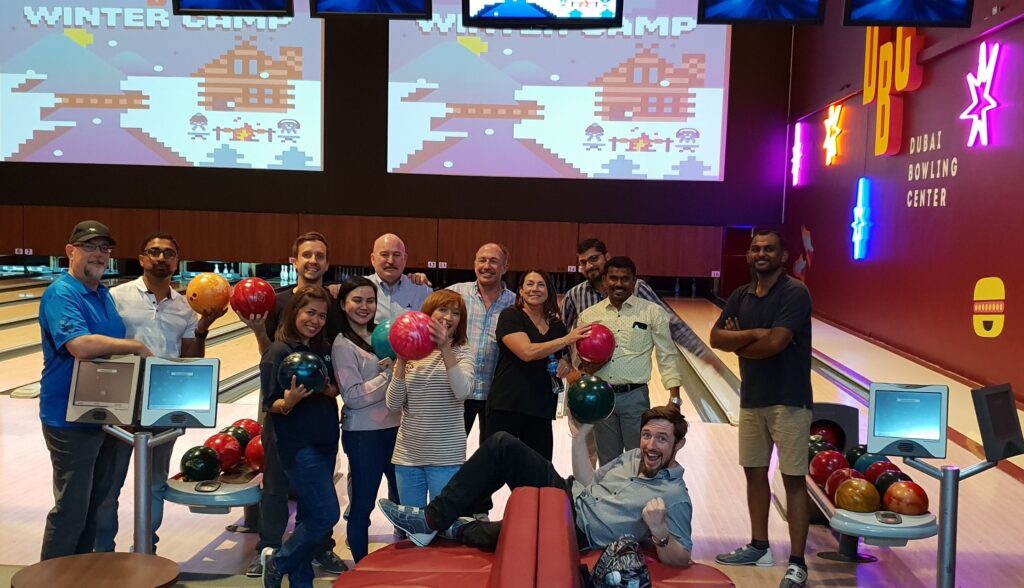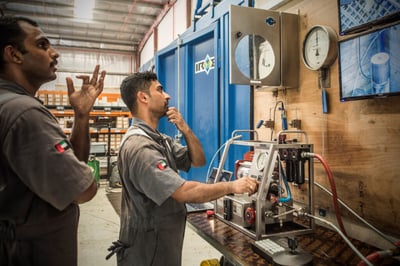5 Tips On Cold Stacking a Rig
If you have a rig that’s about to go out of contract, it may seem like a financially sound idea to...

In any downturn, companies are forced to adapt. For many in the energy sector, that means cutting costs wherever possible in order to keep operations going.
While it’s important to make cost-savings, many businesses look at financial outgoings such as staff wages and make cuts based on their standalone value. However, this method can have an impact on the performance and profitability in other areas of the business.
If you want to survive a downturn and come out stronger on the other side, we need to look at the bigger picture. We spoke to our colleagues and partners across the industry about how they’re ensuring operations continue.
Studies from all over the world are fairly unanimous in proving a link between job security and employee productivity - one study by KPMG found that job security is the key priority to 75% of people in a job search.
Treat employees as your most valuable asset - they aren’t just numbers you can cut from a spreadsheet. Try everything you can to retain staff and create a positive work environment to maintain productivity through this period. Many companies are quick to cut staff on the ground, only to find a few months down the line they have left remaining personnel with unrealistic workloads.

Instead of making cuts during the downturn, several of our partners have made strategic decisions to avoid job losses. These have included:
Not only did they make the cuts they needed to survive, they cemented their commitment to their team by showing that people on the ground are just as essential as the CEO.
An overloaded workforce isn’t useful to anyone. Stress and extra pressure in the workplace can result in less focus, meaning more mistakes. On a rig, mistakes can have very serious consequences for the safety of employees so reducing stress should be a focus of management.
Fatigue management is also an important factor to consider. During the current lockdown, for example, many rig personnel were unable to be relieved of work as travel was restricted across most countries. This resulted in huge fatigue and low morale across the industry.
We recommend following guidelines from bodies such as the IOGP to update HSE policies and get a fatigue prevention plan in place. If you are unable to relieve employees of duty due to government guidelines, there are still many measures to keep your staff happy and connected.
We spoke to some of our customers to find out how they were tackling such issues. To keep their staff entertained, some of the companies we spoke to had purchased games consoles and sporting equipment. We thought this was a great initiative to help staff take their minds off work and stimulate some healthy teamwork and comradery. It’s also important to ensure your staff can stay in touch with friends and family over video. To avoid overloading your internet bandwidth, create ‘internet use shifts’ to make sure everyone gets their turn. See our guide on staying connected during a downturn for more information. 
Work with your team at every level to create an open, honest environment. While the people at the top are able to make the big decisions, the personnel on the ground will have brilliant ideas on how costs can be cut, and it could deliver some innovative ideas if challenges are faced head-on.
The greatest inventions in history have come from engineers and inventors that took an alternative approach to problem-solving. It’s therefore important to gather as many perspectives as possible when solving complex problems. Pick your team’s mind and find out how they would tackle the everyday issues you see on site. Ensure staff in purchasing, operations, QHSE and logistics departments are all communicating to help develop better-informed solutions. Celebrate idea creation and incentivize it, create an environment for it where they know they won’t lose their job for trying something different.
With rigs at reduced capacity and being stacked, everyone in the industry is going through a difficult period. At this time, it’s important to be strict on your budget, prioritise the materials you need and figure out a plan with your suppliers and partners. We are all feeling the strain, so don’t be afraid to be upfront about it but remember to approach the situation in the right way.

For example, we’ve received multiple generic letters from customers requesting discounts of up to 30% on orders. This is a substantial level of discount for us and for most suppliers or manufacturers. While we are always open to negotiations with our clients, unrealistic targets can make it difficult to find common ground between both parties. Each supplier will have different levels of flexibility on pricing for individual products, so we always try to negotiate on a product by product basis rather than offering blanket discounts.
You should take this specific approach into your strategy with suppliers too. Rather than a catch-all email, engage with your major suppliers one by one and formulate a solution which is created and agreed by both parties. If you are open and empathise with your suppliers’ situation, they are far more likely to return that gesture and become more enthusiastic about finding those discounts.
Another common mistake we see is that discount requests are made alongside a threat of losing business. This is discouraging and is rarely backed up. It is widely argued in most literature on the art of negotiations that the carrot is far more effective. If you want to give an extra incentive in negotiations, set a time limit on your discounts. Trust us, it's far easier to get your suppliers to agree to discount structures if they know it is not permanent.
Take the time out of your day to contact your suppliers and have that conversation - you’ll see that the answer to your problems is out there.
While a rig is off-contract, it’s very easy to put off maintenance as you focus your finances in areas that will see immediate returns. However, this
short-term thinking can increase expenditure in the longer term.

Preserving equipment will ensure that re-activation costs are much smaller when the rig is back in service, taking care to ensure all perishable items remain protected from the elements, all spares are organised with a proper inventory and mechanical equipment is regularly turned over to ensure everything stays lubricated.
A well known but extremely cost-efficient tip for stacking rigs is to use anti-corrosion tape to wrap the parts most vulnerable to the elements. Ask any engineer and they’ll swear by a roll of Denso tape! Have the team wrap junction boxes and glands, pipe fittings, hydraulic components and anything else you think might deteriorate. You’ll be surprised at how much this low tech solution will save at the end of the stack.
If you're looking for a lower-cost alternative to the anti-corrosion tape, get in touch!
It’s not just the parts on the active machinery you need to take care of, it’s your entire inventory.
Managing inventory a little closer can save thousands of dollars every month, with very little extra effort from the maintenance team. The best part about this is that it doesn’t require any investment in extra training or personnel and can be actioned immediately.
A good inventory manager will have a check-in, check-out system to ensure every part is used. Try out a stricter process and you’ll see your order spend on replacement parts reduce almost immediately.
We’ve been on many rig visits where new parts such as valves have been left out in the open instead of being returned to the storeroom. Over time this can result in components becoming weather-worn and unusable.
When stacking a rig you should review the expiry dates of products like elastomers that are likely to expire before your next contract. This way, you’ll know what needs replacing when operations pick up again but could also generate income in the shorter term. Rigs maintaining operation will be happy to buy your expiring items at a discounted price so you can make money on stock that would have been scrapped anyway - it’s a win-win.
If you want support on marketing surplus from spares from rigs or further help on saving money during this downturn, leave your details and a member of the team will reach out!
If you have a rig that’s about to go out of contract, it may seem like a financially sound idea to...
The recent market crash took many in the industry by surprise. We discuss how we’ve managed to...
Achieving worldwide use, the RIGTOOLS Clamp is the most popular product developed by RIGTOOLS,...